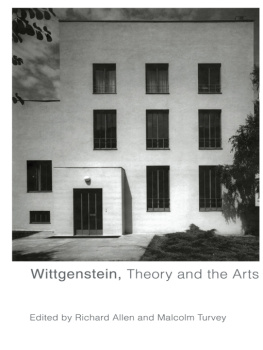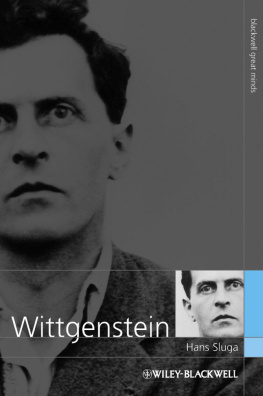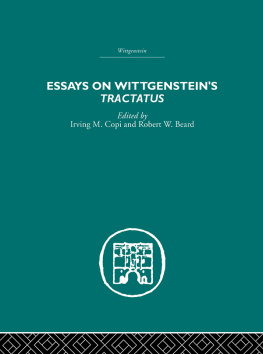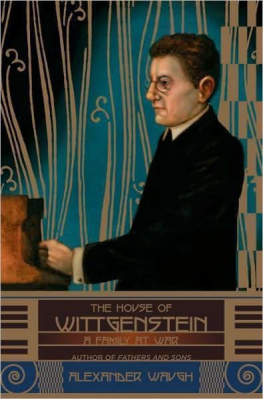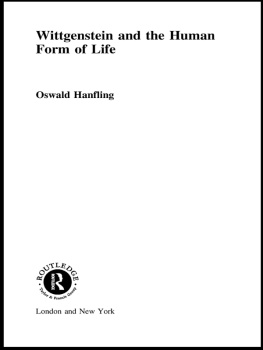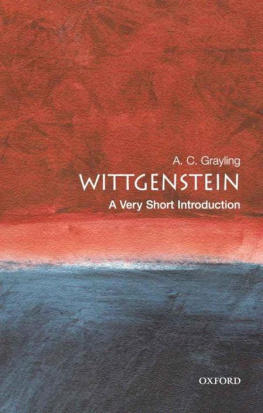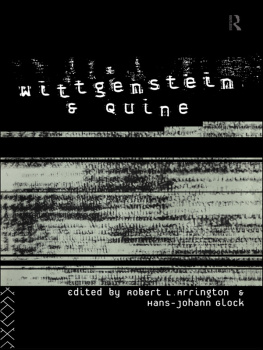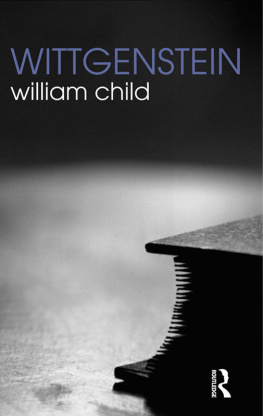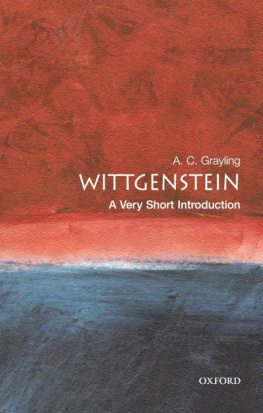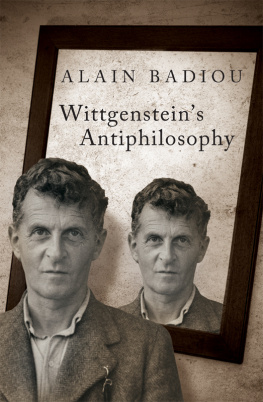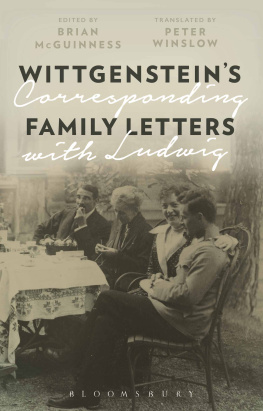Ästhetik - Wittgenstein, Theory and the Arts
Here you can read online Ästhetik - Wittgenstein, Theory and the Arts full text of the book (entire story) in english for free. Download pdf and epub, get meaning, cover and reviews about this ebook. City: London, year: 2006;2001, publisher: Taylor & Francis (CAM);Routledge, genre: Religion. Description of the work, (preface) as well as reviews are available. Best literature library LitArk.com created for fans of good reading and offers a wide selection of genres:
Romance novel
Science fiction
Adventure
Detective
Science
History
Home and family
Prose
Art
Politics
Computer
Non-fiction
Religion
Business
Children
Humor
Choose a favorite category and find really read worthwhile books. Enjoy immersion in the world of imagination, feel the emotions of the characters or learn something new for yourself, make an fascinating discovery.
- Book:Wittgenstein, Theory and the Arts
- Author:
- Publisher:Taylor & Francis (CAM);Routledge
- Genre:
- Year:2006;2001
- City:London
- Rating:5 / 5
- Favourites:Add to favourites
- Your mark:
- 100
- 1
- 2
- 3
- 4
- 5
Wittgenstein, Theory and the Arts: summary, description and annotation
We offer to read an annotation, description, summary or preface (depends on what the author of the book "Wittgenstein, Theory and the Arts" wrote himself). If you haven't found the necessary information about the book — write in the comments, we will try to find it.
Wittgenstein, Theory and the Arts — read online for free the complete book (whole text) full work
Below is the text of the book, divided by pages. System saving the place of the last page read, allows you to conveniently read the book "Wittgenstein, Theory and the Arts" online for free, without having to search again every time where you left off. Put a bookmark, and you can go to the page where you finished reading at any time.
Font size:
Interval:
Bookmark:

Throughout this volume, the standard abbreviations for Wittgensteins works will be used. They are as follows:
| AWL | Wittgensteins Lectures, Cambridge 193235 |
| BB | The Blue and Brown Books |
| CE | Cause and Effect: Intuitive Awareness |
| CV | Culture and Value |
| LA | Lectures and Conversations on Aesthetics, Psychology; and Religious Belief |
| LE | Lecture on Ethics |
| LFM | Wittgensteins Lectures on the Foundations of Mathematics |
| LPP | Lectures on Philosophical Psychology 19461947 |
| LW I | Last Writings on the Philosophy of Psychology: The Inner and the Outer , Volume I |
| LWII | Last Writings on the Philosophy of Psychology: The Inner and the Outer , Volume II |
| NB | Notebooks, 19141916 |
| OC | On Certainty |
| PG | Philosophical Grammar |
| PI | Philosophical Investigations |
| PO | Philosophical Occasions 19121951 |
| PP | Wittgensteins Lectures in 193033 in Philosophical Papers |
| ROC | Remarks on Colour |
| RPPI | Remarks on the Philosophy of Psychology , Volume I |
| RPPII | Remarks on the Philosophy of Psychology , Volume II |
| TLP | Tractatus Logico-Philosophicus |
| Z | Zettel |
The editors are grateful to John Hyman for his comments upon the introduction, and Rahul Hamid for his editorial work. Thanks also to Tony Bruce at Routledge for his support for this project and to Muna Khogali for helping us to stay on course. Finally, the editors wish to thank Bridget Sisk and Sarah Wilcox for their moral support.
Charles Altieri (1976) Wittgenstein on Consciousness and Language: A Challenge to Derridean Literary Theory, Modern Language Notes 91(6): 1397423. The Johns Hopkins University Press. Reprinted with permission.
Richard Allen is Associate Professor of Cinema Studies at New York University. He is author of Projecting Illusion (Cambridge University Press, 1995) and co-editor of Film Theory and Philosophy (Clarendon, 1997) and Hitchcock: Centenary Essays (BFI, 1999).
Charles Altieri teaches in the English Department at the University of California, Berkeley, where he is also the Director of its Consortium for the Arts. His most recent books are Subjective Agency (Blackwell, 1994) and Postmodernisms Now (Pennsylvania State University, 1998).
P.M.S. Hacker is Fellow of St Johns College, Oxford. He is author of numerous books, among which are Insight and Illusion: Themes in the Philosophy of Wittgenstein (Oxford University Press, 1972; revised edition, 1986); Appearance and Reality (Blackwell, 1986); An Analytical Commentary on Wittgensteins Philosophical Investigations in four volumes (volumes 1 and 2 together with G.P. Baker) (Blackwell, 198096). His most recent book is Wittgensteins Place in Twentieth-century Analytic Philosophy (Blackwell, 1996).
Oswald Hnfling is Visiting Research Professor at the Open University. He is the author of numerous articles on Wittgenstein and his books include Wittgensteins Later Philosophy (Macmillan, 1989) and Philosophy and Ordinary Language (Routledge, 2000).
John Hyman is Fellow and Praelector in Philosophy at Queens College, Oxford. He is author of The Imitation of Nature (Blackwell, 1989) and editor of Investigating Psychology (Routledge, 1991).
Graham McFee is Professor of Philosophy at the University of Brighton. His major research interests, in addition to the philosophy of Wittgenstein, are in aesthetics, and in the philosophy of understanding. His principal publications include Understanding Dance (Routledge, 1992) and Free Will (Acumen, 2000).
Louis A. Sass is Professor of Clinical Psychology at Rutgers University, where he also serves on the graduate faculty in comparative literature and is an affiliate of the Center for Cognitive Science. He is author of two books: Madness and Modernism: Insanity in the Light of Modern Art, Literature, and Thought (Harvard University Press, 1992), and The Paradoxes of Delusion: Wittgenstein, Schreber; and the Schizophrenic Mind (Cornell University Press, 1994); he also co-edited Hermeneutics and Psychological Theory.
Severin Schroeder is Lecturer in Philosophy at Lady Margaret Hall and Christ Church, Oxford. He is the author of several articles on Wittgenstein, a monograph on Kripkes Naming and Necessity (ber namensphilosophische Intuitionen , Hnsel-Hohenhausen, 1992), and a book on Wittgensteins private language argument ( Das Privatsprachen-Argument, Schningh, 1998). He has edited Wittgenstein & Contemporary Philosophy of Mind (Palgrave, 2001).
Ben R. Tilghman is Professor Emeritus at Kansas State University where he taught from 1967 to 1994. Previously he taught at Reed College, Western State College of Colorado, and the University of Wyoming. His publications include The Expression of Emotion in the Visual Arts (Martinus Nijhoff, 1970), Language and Aesthetics (University Press of Kansas, 1973), But is it Art? (Blackwell, 1984), Wittgenstein, Ethics and Aesthetics (State University of New York Press, 1991), and Introduction to the Philosophy of Religion (Blackwell, 1994).
Malcolm Turvey is former Managing Editor of the journal October , and has just joined the faculty of Sarah Lawrence College to teach film history. He has published articles on Wittgenstein, film theory and avant-garde film.
WITTGENSTEINS LATER PHILOSOPHY
Richard Allen and Malcolm Turvey
To date, Wittgensteins later philosophy has had little if any lasting influence on humanistic disciplines that study the arts. The highly original conception of philosophy he pioneered in his later writings, and his realization of this conception in investigating the manifold uses of language in the stream of human life, are almost entirely unknown to scholars in fields such as film studies, literary studies, history of art and cultural studies. And while there are a few exceptions to this situation, they tend to foster misunderstandings of Wittgenstein due to their over-hasty assimilation of his work to philosophical trends that are currently prevalent in the humanities (most notably, various forms of scepticism). Meanwhile, although his later conception of philosophy is more familiar to Anglo-American aestheticians, it is not widely adhered to by them.
The primary goal of this volume of essays is to help in the task of rectifying this situation by making Wittgensteins later philosophy better known and understood to scholars in these disciplines. For although Wittgenstein himself did not spend much time on the sort of philosophical questions they raise, or address the broader implications of his later philosophy for the humanities in general, he nevertheless has much to teach scholars who study literature, the arts and culture. As in other domains of knowledge, the powerful methods he employed in his later writings can yield considerable riches when applied to questions and problems of a properly philosophical nature encountered by such scholars. As many of the essays in this volume demonstrate, these methods can extirpate the conceptual confusions to which scholars of the arts succumb, and enable a perspicuous grasp of the distinctive concepts they use in studying artistic phenomena.
Just as importantly, Wittgensteins later conception of philosophy, as well as his own investigations into the logical character of explanations of human behaviour precipitated by this conception, have far-reaching ramifications for the very practice of the humanities, for the way human beings as social, historical and cultural beings are studied. As one of Wittgensteins former students, the philosopher G.H. von Wright, has argued, they can provide the foundations for a veritable philosophy of the humanities, one that clarifies the forms of explanation that are logically appropriate to the subject matter of humanistic disciplines, thereby defining and defending the autonomy of humanistic understanding (von Wright 1993: 165).
Font size:
Interval:
Bookmark:
Similar books «Wittgenstein, Theory and the Arts»
Look at similar books to Wittgenstein, Theory and the Arts. We have selected literature similar in name and meaning in the hope of providing readers with more options to find new, interesting, not yet read works.
Discussion, reviews of the book Wittgenstein, Theory and the Arts and just readers' own opinions. Leave your comments, write what you think about the work, its meaning or the main characters. Specify what exactly you liked and what you didn't like, and why you think so.

